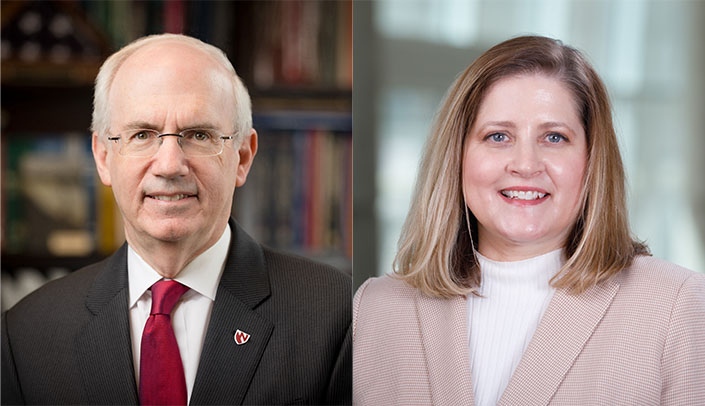As part of the August campus forum and the med center’s ongoing emergency preparedness work, UNMC Chancellor Jeffrey P. Gold, MD, has announced plans for two Stop the Bleed train-a-thons on campus.
The 45-minute training sessions, in partnership with UNMC Healthcare and Emergency Responder Organization Education through Simulation (HEROES) Program and Nebraska Medicine’s trauma services, will be Monday, Aug. 29, in the Lower Storz Pavilion and Wednesday, Sept. 14, in the Truhlsen Events Center inside the Sorrell Center.
Stop the Bleed is a national initiative that trains people to recognize life-threatening bleeding and intervene effectively by applying pressure, packing a wound or applying a tourniquet. Registration for the on-campus training is available here. Attendees must complete an online interactive course prior to the in-person event.
Organizers hope to train 1,000 people per day and are looking for instructors and general event volunteers. Complete this interest form to volunteer as a trainer. To volunteer in a support role, such as check-in or traffic control, sign up here.
Funding for the training was provided by the University of Nebraska Foundation and the Nebraska Medicine Guild.
During the forum, Dr. Gold was joined online by Jane Meza, PhD, interim executive director for health security for UNMC, to discuss COVID-19 and the monkeypox outbreak, which the U.S. recently declared a public health emergency.
"It’s front and center on our radar screens," Dr. Gold said of monkeypox, noting the U.S. currently has the largest number of cases and one of the fastest doubling times for cases.
Members of the medical center community can view the forum.
Monkeypox spreads through close contact, he said, but also through coughing and sneezing with symptoms similar to COVID-19, influenza and the common cold. Anyone with symptoms or who may have been exposed should contact Employee Health or Student Health to arrange for testing.
On COVID-19, Dr. Meza reiterated UNMC’s guidance on the virus, including:
- Wearing surgical masks or KN95s in all public, common and patient-facing areas on campus. Masks are not required when eating alone in an office or room with a closed door, in individual library study rooms or when eating indoors if distanced, or outdoors.
o For conference rooms and auditoria, individuals can unmask if the number in the room is 40% or less of the room capacity and all individuals are socially distanced. Socially distanced room capacities for some rooms are available online.
o Lecturers are not required to wear a mask if it significantly interferes with their ability to be heard or understood. If no mask is worn to optimize the learning environment, lecturers must have at least six feet distance from others.
- Screening for symptoms using the free 1-Check UNMC app.
- Contacting Employee Health or Student Health if you’ve been exposed to COVID-19 and are experiencing symptoms.
- Testing, which remains available in Williams Science Hall on the Omaha campus through December. Testing also will be available in Lincoln on both East and City campuses. Watch the UNMC coronavirus website for updated testing info for all UNMC locations.
Drs. Meza and Gold answered questions on COVID-19 and other issues from the large group of Zoom participants. Dr. Gold also:
- Encouraged UNMC faculty, staff and students to attend the #WeAreUNMC BBQ on Aug. 24 from 3:30 to 6 p.m.
- Reminded the audience to explore Handshake at UNMC, an online site for students and alumni to engage with employers and locate internships, research opportunities and part- or full-time jobs.
- Invited participants to send him and Dr. Meza ideas for future Breakthrough Thinking sessions.
- Provided updates on leadership searches, acknowledging the magnitude of the ongoing transitions, but said he’s confident UNMC will find talented individuals to continue the successful course set by individuals leaving or retiring.
In closing, Dr. Gold said, these are stressful times, which impact everyone differently. He urged faculty, staff and students to be aware of their physical and mental health, "show grace toward each other and yourself" and seek out help and med center resources as needed.
